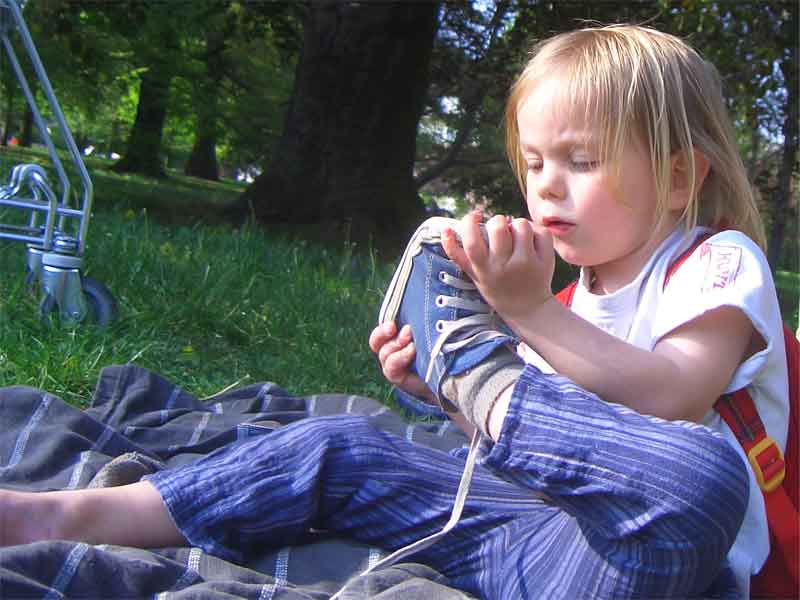Of Defiance, Autonomy and Power Games

Children come into the autonomy phase (commonly called the ‘terrible twos’) at around two years of age. What is the point of this phase? Many may ask, as I asked myself a while ago. This is nature’s way of ensuring our little Homo sapiens will strive to become independent and discover the will-power to impact the world around them. This is why they want to do everything by themselves - and why we should let them. When we insist on helping when help isn’t wanted, we go against the child’s quest to grow up, bringing nature’s plans in a muddle. By intervening we also tamper with the child’s self-esteem - it is not up to us to judge and grade how our children eat their food, they manage to maneuver food into their mouths by themselves with a lot more concentration when we leave them to it. Taking the spoon away proves you don’t think they can do it or believe they’re not doing it properly and hinders them in perfecting the art of spoon-using.
I observed a two year old on the playground, pulling on his mother’s rucksack, trying to find the opening. “You’re hungry. Wait…” Said the mother and saw it as her business to open the rucksack and rummage around until the correct container was found. The whole ordeal was extremely stressful; the mother kept saying “wait a second! Stop that! That’s enough now! I’m getting it!” and pushed the boy away from her as he was constantly whinging/crying/pulling on her arms because he naturally wanted to find the Tupperware with the food in it himself.
So in this autonomous endeavor, children can also become extremely frustrated when they haven’t been able to decide things for themselves or independently do things for themselves to their contentment that day. They start to demand self-government at the most inconvenient times - when brushing their teeth, eating at a restaurant or choosing items in the supermarket. They can’t hear your council or your requests because their need for autonomy hasn’t been stilled. They can’t help it - their instincts and impulses drive them. They aren’t defiant to annoy you; they are in the course of becoming human beings that make decisions and cooperate with their families and communities. These instincts enable their survival in the world; without them they’d be constant lap-dwellers and dependent sociopaths.
Power games offer a kind of prevention for tantrums and defiance. It’s absolutely not about tricking children into compliance, rather that we meet the needs of the children so that they needn’t dwell on the one need for autonomy and may direct their attention to other things such as cooperation or simply experiencing and learning.
Children naturally use power games to still their needs - think of the running away and hiding from pjs or all the times you said “don’t do that” and the kid did it without the bat of an eye lid. They want to experience their ability to influence the world in a safe setting - they want the power games!
Power games are also a wonderful way of solving conflicts. Instead of forcing a children or even reprimanding them, we can play their game and have fun while doing it.
The next time your child tips a box of toys out when you asked him not to, indulge him in his power game: “Oh nooooo! You tipped the box out! I said no toys on the floor! What am I going to do now?!” You can tidy them up, all the while saying such things in an exaggerated, playful tone, then say “Don’t tip them out. I’m going to turn around and when I look this must still be here!” incorporate some playful bits in your game. Your child will be giggling and will know its cue to throw it all out again. This should be repeated however often the child wants, in order for him to feel the autonomy he craves.
My four year old son invented ‘The Sleeping Game’ where I tell him not to wake me, pretend to sleep, and of course am poked awake. I say “Who woke me up?! I said not to wake me up! I must sleep…” and he laughs his head off.
He also loves “The Pushing Game” where I try to get up and he lays on me: “I need to get up, oh no, I need to use my arms…”
Such games do not provoke the child to become dominant (that’s rather what praise and punishment do, as the use of power isn’t experienced playfully, it’s abusive); they meet a strong need and relieve any tension in the parent-child relationship that may result from suppressing this powerful phase where the will is discovered.
The will of the child is his motivation and drives him to become independent. It’s not for us to suppress, but to acknowledge, indulge and support.
I invite you to take your liberty and join the revolution!



